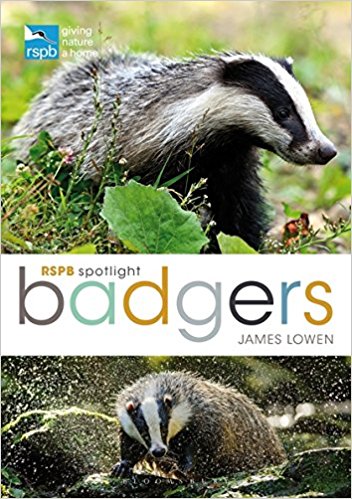Family Pets
| RSPB Spotlight on Badgers book |
 |
James
Lowen explores the lives of badgers and their communal
living, feeding habits and threats to their conservation. Click
here to buy:
Paperback edition
Kindle edition
|
We are often asked about what effect the presence of badgers
will have on family pets.
Firstly, badgers are opportunistic feeders. In order words they
mainly eat things they come across, and do not go out on
"tours" looking for particular animals to eat or species
to kill.
Badgers are also very keen to eat carrion (i.e. dead meat), and
will often succeed in taking meals from other species like small
dogs, cats, ferrets, stoats, weasels, hedgehogs and foxes. For
every 100 instances of badgers being seen eating family pets (like
cats, dogs and rabbits), it is probably less than 2 that the
badger has actually done the killing. In our over-crowded island,
a badger is far more likely to find a dead cat that has been
killed by a car than to kill the cat itself. Of course, the
"witness" frequently assumes the badger killed that cat,
but all they actually saw was the badger eating an already-dead
victim of a traffic accident.
That said, people still want to take whatever precautions they
can, and our advice as as follows:
- Listen to your pet. If your cat suddenly grips its claws
into the carpet and really does not want to be put outside, it
might be able to see an unfriendly face in the garden (that
you can't see). If your terrier suddenly becomes very excitable
and is desperate to go outside, it may have heard a badger or
a fox come into the garden. Putting either pet outside just
then may well result in injury, so just wait half-an-hour and
try again (if need be).
- Try and make sure free-living pets have an escape route if
they encounter a badger.
- Avoid feeding pets at the end of enclosed alleyways or in
where they can be cornered by a badger or a fox (such as in sheds or
outhouses).
- Make sure your pet can always get to safety - for example
through a snug-fitting cat flap or by jumping into the house
through a ground-floor waist-level window which is ajar or by climbing a
tree.
- Rarely, dogs are stupid enough to square up to a fight with
a badger; and can get seriously hurt in the process. The best
way to avoid this is to avoid letting your dog roam free
during the hours of darkness. Keep it on a short lead at
night; and especially if it is the sort of inquisitive dog
that likes to explore burrows and tunnels in the woods. This
advice is especially important between about December and
August, when badgers will do their utmost to protect their
cubs. Terriers especially should be kept on a lead on woodland
walks from the onset of dusk through until early dawn.
- Cats may get very upset if the badger is eating the meal you
have put out for the cat; but exceptionally few cats are
suicidal enough to confront a badger. In the vast majority of
cases, a cat will use it's intelligence and speed to run away
from a fight.
- Pens or runs made from thin wood or chicken wire are not
badger-proof; and badgers may on rare occasions attack any small penned animal,
chicken or duck they come across. This will be a small risk if you keep
rabbits, chickens (or ducks), guinea pigs, hamsters,
gerbils, rats, mice, or ferrets in a pen in your countryside
garden. The solution is to buy a professionally-built animal
house, with a substantial tough floor, walls and roof; and to
pen your pets in at night. Make sure doors and entry flaps are
securely locked (and not just closed). A badger will find it
easy to lift up most cheap lightweight rabbit hutches; and
many will be able to lift up the sort of hutch roofs that are
held in place simply by their own weight. Remember too that domestic
cats and dogs and wild foxes will attack pets far more often
than badgers will.
- A badger will be able to get through rotten wood very easily
indeed, so make sure the wood remains in very good condition.
This is especially important under drinking receptacles and areas soaked in excrement or urine; as this will cause the
wood to weaken and rot very quickly. Take note too of human-sized
doors into animal houses. If they have loose hinges or are
flexible enough to bend, they may allow a badger enough room
to claw away at the edges of the door and eventually gain
entry.
- If your pets are very young (and wouldn't know to be scared
of a badger), or infirm (and couldn't run away) or if your
pets have just moved from the "city" to the
"countryside", they may be at slightly higher risk.
Avoid putting them outside between dusk and dawn if badgers
come into your garden or if your pet may stray into badger
territory. After a "scare" most new pets
quickly get used to their new surroundings and learn what is
friendly from what is not.
In terms of the level of risk; we would say that of more than
5,000 emails handled by Badgerland only 3 have recorded instances
of cats or dogs being injured by badgers. By all means be aware
that the risks are slight, and most pets are unharmed if you and
they use common-sense.

|
